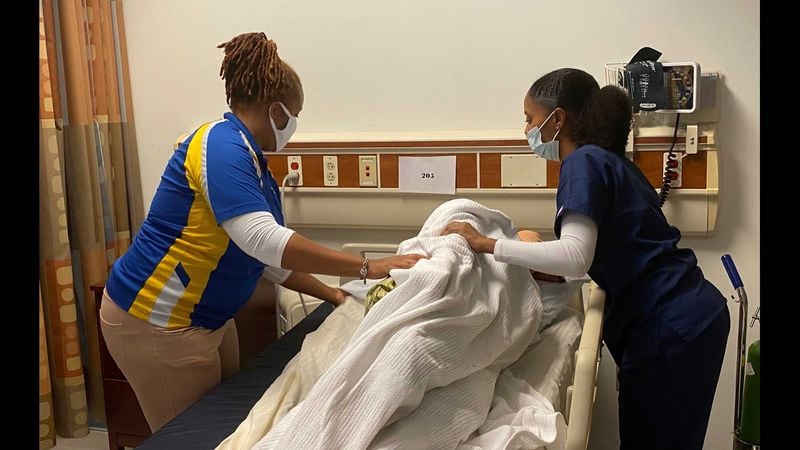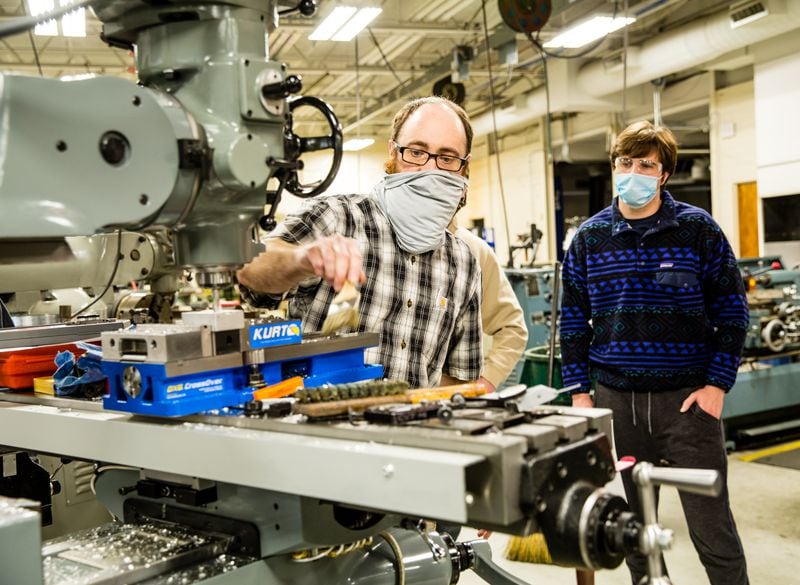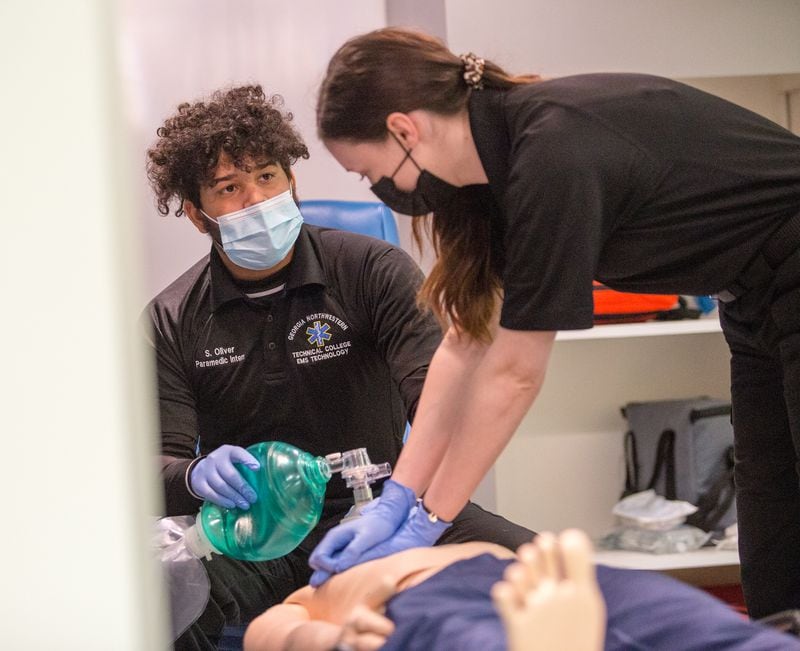ROME — Georgia Northwestern Technical College President Heidi Popham frequently uses the word “teamwork” when discussing the school’s operating approach since the coronavirus pandemic began.
Precision manufacturing instructor Bart Jenkins allows students to work in his classroom even when they don’t have class. Steven Price, 20, completed Jenkins’ class last year and came back to help current students after getting laid off from his machine shop job in October. Price is working on skills he hopes will get him a job at Delta Air Lines.
“I had to give (students) the time they needed,” said Jenkins. The pandemic has cut into regular class time, limiting the number of students who could be in class at the same time and the amount of classes that could be held in person.
Georgia’s 22 technical colleges — the schools state officials rely on to provide training for working adults and younger students pursuing careers in high-demand industries like nursing, trucking and film production — are looking for new ways to adapt to the needs of students. Its fall total credit enrollment dropped by 8.5%, to 94,556 students compared to last fall, system officials recently told The Atlanta Journal-Constitution. Dual enrollment — which allows high school students to take state-funded college courses — declined by 19%, their numbers show. Nearly one-quarter of its students are dual-enrolled.
The enrollment decline reflects national statistics showing significant drops in the number of students in community colleges. Georgia officials attribute the fall decline largely to the difficulty school districts are having with in-person learning and their ability to conduct dual enrollment. Many education experts say the decline nationwide is a sign these types of colleges are in trouble.
The pandemic has created unique challenges for the technical colleges. Most of them don’t conduct on-site COVID-19 testing, referring students to off-campus testing locations. The colleges have limited how many students can come to some classes.
Many classes, though, require hands-on learning. Jenkins’ class, for example, looks like a factory, with hulking machines that can carve metal in seconds. At Georgia Northwestern Technical, nearly all instructors have GoPro equipment that allows them to teach virtually. The school’s foundation has also raised money to help students pay for laptop computers or textbooks.
The schools are working in other ways to better connect with students, such as communicating more frequently through the registration and advisement process, offering more online tutoring and providing courses students anywhere in the system can take through its eCampus program.
Still, system leaders anticipate a similar enrollment drop this semester because of a rise in COVID-19 cases and deaths since December. They hope enrollment will increase as more Georgians get vaccinated.
Federal statistics show college enrollment declines were greatest among new students, particularly among low-income and historically underrepresented students. A new Southern Regional Education Board report found families with household incomes less than $30,000 are spending more money — 38% of their income — on tuition and fees at Georgia’s public colleges and universities. The percentage, based on 2017-18 data, the most recent year available, is 3 percentage points higher than five years ago.
Susan Lounsbury, the organization’s director of data services, said the recent national statistics point to ongoing issues concerning college affordability, such as the lack of student financial aid or the unwillingness to take on more debt.
Credit: Jenni Girtman
Credit: Jenni Girtman
Georgia’s system, like all state agencies, cut its budget by 10% last year. The budget cuts included a handful of layoffs, Technical College System of Georgia Commissioner Greg Dozier said in an interview. Emergency federal funding helped the system through the fall, officials said.
Dozier said the pandemic has nudged the system into some changes. Its schools are working with companies to create more apprenticeships with younger students. They’re also helping students seeking their high school equivalency, an alternative to a high school diploma, to simultaneously get certificates.
“I think COVID has caused us to look and see how we can break down silos to make sure that we’re seeing everybody from the beginning of education to the end,” said Dozier, named commissioner in December 2019.
Ogeechee Technical College, located in Statesboro, said it saw a 4% enrollment increase, to more than 2,100 students. Its president, Lori Durden, said officials there worked closely with high school counselors in the area to conduct advisement sessions with students on Zoom that made it easier to provide dual enrollment courses. They also communicated more frequently with students, particularly through text messages, to help them register for classes and provide payment options.
“We try to engage with students as quickly and immediately as possible,” Durden said.
At Georgia Northwestern Tech, which saw an enrollment decline of one-tenth of a percent, to about 6,600 students, the biggest challenge is determining the best ways to provide courses. They’ve tried to offer more courses online, but many students want courses on campuses.
“The challenge is to offer what all of our students need, and I don’t think we can do it all, all the time,” said Popham, its president.
The college has six campuses. Its main campus sits among large tracts of farmland and manufacturing companies. When business owners talked to the college about the need for a flooring production program, the school created a curriculum with the help of donated equipment.
Credit: Jenni Girtman
Credit: Jenni Girtman
Since the pandemic, respiratory and other health care courses have taken on greater importance. Samuel Oliver, 21, an aspiring emergency room physician’s assistant, said the college has worked to be more accessible. He’s on campus three days a week.
On a recent Tuesday, Oliver and three classmates worked in and around a rectangular structure the size of a food truck that was an ambulance simulator. A mannequin laid on a stretcher and it was Oliver’s job to check the mannequin’s heart rhythm.
The instructor worked a tablet-size device to create the rhythms. The patient was having chest pains and stopped speaking. Oliver prepared to intubate the patient while classmate Caitlin Crete did chest compressions. The instructor stopped the exercise.
The students did their work by the book. The exercise was what Oliver wants for the class. Hands-on learning.
“None of my patients die on my watch,” Crete said after the exercise was over.
BY THE NUMBERS
94,556 - the fall 2020 total credit enrollment
8.5% - the enrollment decline from the fall 2019 semester
21,734 - the fall 2020 total credit dual enrollment
19% - the dual enrollment decline
Source: Technical College System of Georgia





/cloudfront-us-east-1.images.arcpublishing.com/ajc/P7DYBH6TO7FEKG4SUXQQKADRXE.jpg)



